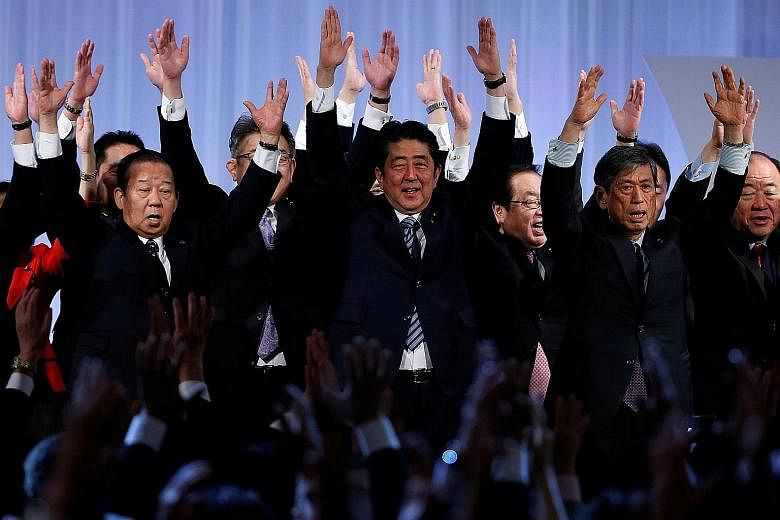TOKYO • Japan's ruling party yesterday extended term limits for its leaders, a change that gives Prime Minister Shinzo Abe a shot at becoming Japan's longest-serving post-war leader.
He would have had to step down as party leader and prime minister in September next year, even if his Liberal Democratic Party (LDP) was still in power.
The LDP congress approved extending the limit to three consecutive three-year terms, from a two consecutive three-year term limit.
This means Mr Abe can stand for re-election in the next party leadership vote some time next year. And if he wins that vote and also wins national polls - Lower House elections are due before December next year - he would remain in power until September 2021.
Mr Abe, 62, served as prime minister for about a year before stepping down following a historic defeat in Upper House elections in 2007. He became prime minister again when the LDP returned to power in December 2012 after a three-year period in opposition.
He then launched his "Abenomics" growth plan - a mix of massive monetary easing, government spending and red-tape slashing. Five years on, however, growth remains fragile and inflation is well below the target of 2 per cent.
"We will achieve the great goal of 600 trillion yen (S$7.4 trillion) GDP... keeping a virtual cycle of growth and redistribution of wealth," he said in a speech to the congress.
The decisions at the annual convention come as Mr Abe's right-leaning LDP enjoys a comfortable majority in both chambers of Parliament. Mr Abe has no powerful rivals within the party vying to become the next party leader, and the country's opposition parties are currently in weak positions.
The LDP also adopted a policy principle of "taking a practical step towards proposing amendments to the Constitution". The party has long sought to revise the post-war Constitution that bans Japan from the use of force except in the strictest sense of self-defence.
The Constitution was imposed by occupying US forces after World War II and took effect in 1947.
"The LDP will lead concrete discussion towards proposing amendments to the Constitution. This is the LDP's historic role, isn't it?" Mr Abe said.
Under the Prime Minister, Japan passed a new law in 2015 that allows its Self-Defence Forces to go into battle to protect allies in so-called collective self-defence.
Critics argue that this could drag Japan into distant foreign wars even if there was no direct threat to the country or its people. Mr Abe and his supporters have argued that the rules were necessary to deal with a changing security environment marked by an increasingly assertive China and an unpredictable North Korea.
AGENCE FRANCE-PRESSE

